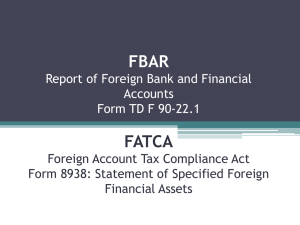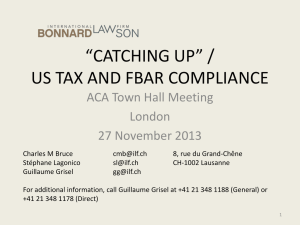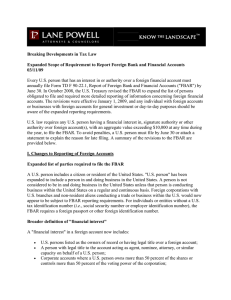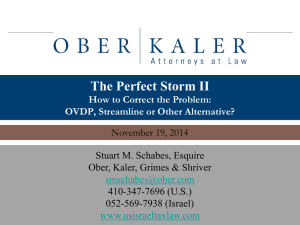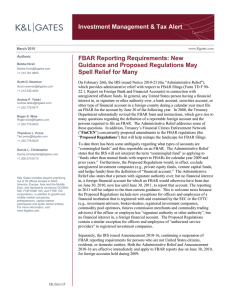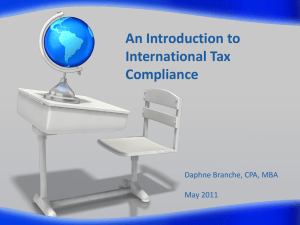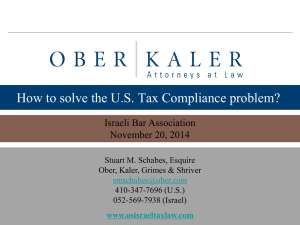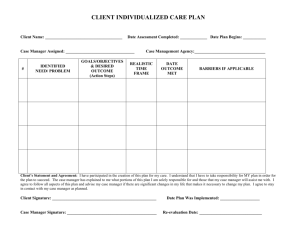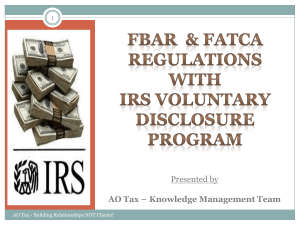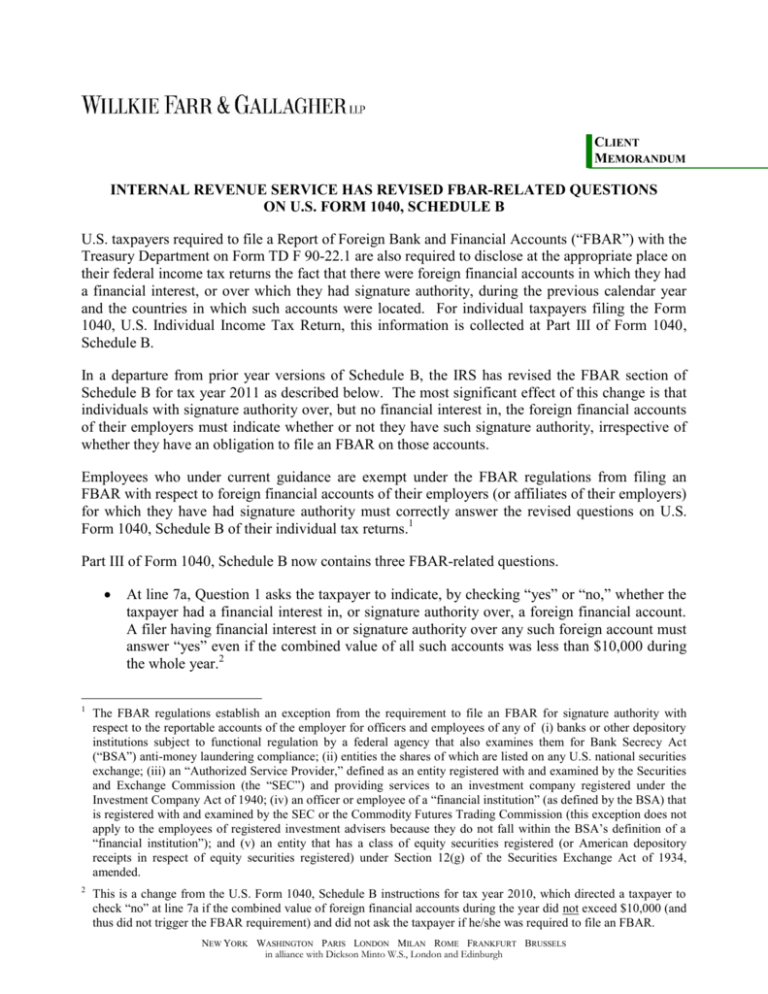
CLIENT
MEMORANDUM
INTERNAL REVENUE SERVICE HAS REVISED FBAR-RELATED QUESTIONS
ON U.S. FORM 1040, SCHEDULE B
U.S. taxpayers required to file a Report of Foreign Bank and Financial Accounts (“FBAR”) with the
Treasury Department on Form TD F 90-22.1 are also required to disclose at the appropriate place on
their federal income tax returns the fact that there were foreign financial accounts in which they had
a financial interest, or over which they had signature authority, during the previous calendar year
and the countries in which such accounts were located. For individual taxpayers filing the Form
1040, U.S. Individual Income Tax Return, this information is collected at Part III of Form 1040,
Schedule B.
In a departure from prior year versions of Schedule B, the IRS has revised the FBAR section of
Schedule B for tax year 2011 as described below. The most significant effect of this change is that
individuals with signature authority over, but no financial interest in, the foreign financial accounts
of their employers must indicate whether or not they have such signature authority, irrespective of
whether they have an obligation to file an FBAR on those accounts.
Employees who under current guidance are exempt under the FBAR regulations from filing an
FBAR with respect to foreign financial accounts of their employers (or affiliates of their employers)
for which they have had signature authority must correctly answer the revised questions on U.S.
Form 1040, Schedule B of their individual tax returns.1
Part III of Form 1040, Schedule B now contains three FBAR-related questions.
At line 7a, Question 1 asks the taxpayer to indicate, by checking “yes” or “no,” whether the
taxpayer had a financial interest in, or signature authority over, a foreign financial account.
A filer having financial interest in or signature authority over any such foreign account must
answer “yes” even if the combined value of all such accounts was less than $10,000 during
the whole year.2
1
The FBAR regulations establish an exception from the requirement to file an FBAR for signature authority with
respect to the reportable accounts of the employer for officers and employees of any of (i) banks or other depository
institutions subject to functional regulation by a federal agency that also examines them for Bank Secrecy Act
(“BSA”) anti-money laundering compliance; (ii) entities the shares of which are listed on any U.S. national securities
exchange; (iii) an “Authorized Service Provider,” defined as an entity registered with and examined by the Securities
and Exchange Commission (the “SEC”) and providing services to an investment company registered under the
Investment Company Act of 1940; (iv) an officer or employee of a “financial institution” (as defined by the BSA) that
is registered with and examined by the SEC or the Commodity Futures Trading Commission (this exception does not
apply to the employees of registered investment advisers because they do not fall within the BSA’s definition of a
“financial institution”); and (v) an entity that has a class of equity securities registered (or American depository
receipts in respect of equity securities registered) under Section 12(g) of the Securities Exchange Act of 1934,
amended.
2
This is a change from the U.S. Form 1040, Schedule B instructions for tax year 2010, which directed a taxpayer to
check “no” at line 7a if the combined value of foreign financial accounts during the year did not exceed $10,000 (and
thus did not trigger the FBAR requirement) and did not ask the taxpayer if he/she was required to file an FBAR.
NEW YORK WASHINGTON PARIS LONDON MILAN ROME FRANKFURT BRUSSELS
in alliance with Dickson Minto W.S., London and Edinburgh
Question 2 at line 7a asks the taxpayer to indicate, by checking “yes” or “no,” whether the
taxpayer is required to file an FBAR and refers the filer to the FBAR form and instructions
for the filing requirements and exceptions.
At line 7b, a taxpayer who has checked “yes” to Question 2 at line 7a is directed to list the
countries in which such accounts were located.
In order to answer Question 1 at line 7a, an employee must know whether he/she has signature
authority over an employer’s foreign financial account.
Each U.S. person, including a citizen or resident of the United States and any entity organized under
the laws of the United States, is required to file an FBAR with the U.S. Treasury Department by
June 30 of each year with respect to foreign financial accounts that had an aggregate value of more
than $10,000 and that the person had a financial interest in, or signature authority over, during the
previous calendar year. The FBAR form is filed separately, according to its instructions. Part III of
Form 1040, Schedule B does not require the taxpayer to attach the actual FBAR filing or to provide
any information regarding the taxpayer’s past or anticipated FBARs. Failure to file the FBAR,
which requires basic information about foreign domiciled accounts, can result in significant civil
and/or criminal penalties.3
***************
If you have any questions regarding this memorandum, please contact Joseph A. Riley (212-7288715, jriley@willkie.com) or the Willkie attorney with whom you regularly work.
Willkie Farr & Gallagher LLP is headquartered at 787 Seventh Avenue, New York, NY 100196099. Our telephone number is (212) 728-8000 and our facsimile number is (212) 728-8111. Our
website is located at www.willkie.com.
March 15, 2012
IRS Circular 230 disclosure:
To ensure compliance with requirements imposed by the Internal Revenue Service, we inform you that any U.S. tax advice contained
in this communication (including any attachments) is not intended or written to be used, and cannot be used, for the purpose of (i)
avoiding penalties under the Internal Revenue Code or (ii) promoting, marketing or recommending to another party any transaction
or matter addressed herein.
Copyright © 2012 by Willkie Farr & Gallagher LLP.
All Rights Reserved. This memorandum may not be reproduced or disseminated in any form without the express permission of
Willkie Farr & Gallagher LLP. This memorandum is provided for news and information purposes only and does not constitute legal
advice or an invitation to an attorney-client relationship. While every effort has been made to ensure the accuracy of the information
contained herein, Willkie Farr & Gallagher LLP does not guarantee such accuracy and cannot be held liable for any errors in or any
reliance upon this information. Under New York’s Code of Professional Responsibility, this material may constitute attorney
advertising. Prior results do not guarantee a similar outcome.
3
For further information on FBAR requirements generally, please see Willkie Farr & Gallagher LLP Client
Memoranda, “Treasury Department Issues Revised Rules for Reporting Foreign Financial Accounts” (Mar. 16,
2011), available here, and “Update on Foreign Bank and Financial Account Reporting: IRS Issues Revised FBAR
Form and Instructions” (Apr. 1, 2011), available here.
-2-

